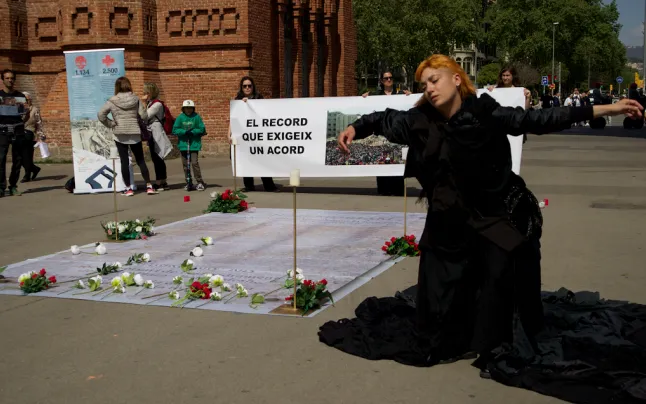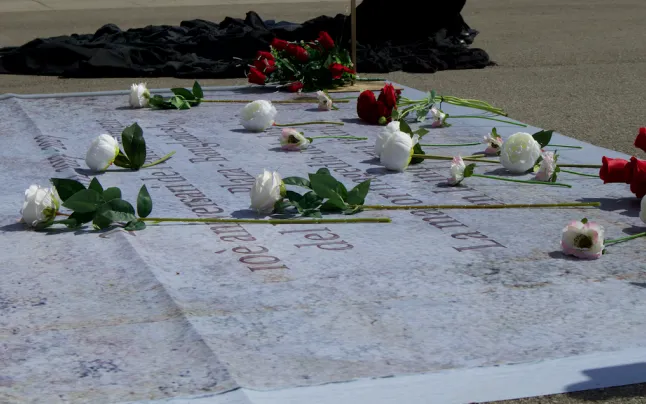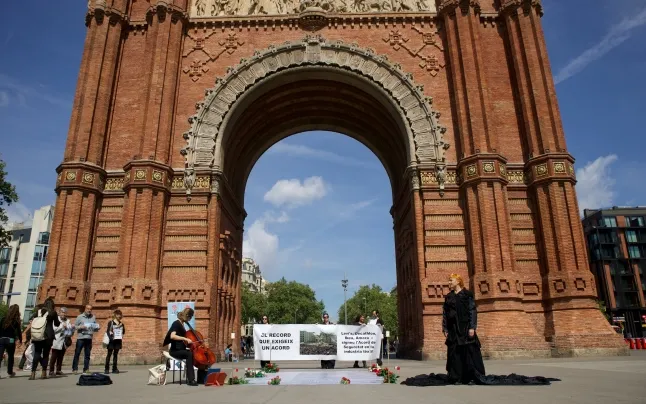The Clean Clothes Campaign demands that big brands sign the agreement to ensure safety in the textile industry
The initiative has made this demand coinciding with the tenth anniversary of the Rana Plaza tragedy in Bangladesh, in which over a thousand textile workers died.
On Monday, April 24, the tenth anniversary of the most significant tragedy in the history of the textile industry was commemorated. We're referring to the collapse of the Rana Plaza building, which housed five clothing factories and in a matter of seconds was reduced to a pile of rubble, causing at least 1,138 fatalities and over 2,000 injuries.
The worst part of it all is that the disaster, which occurred on April 24, 2013, in Savar, on the outskirts of the capital of Bangladesh, could have been avoided if the warnings of the garment factory workers in the building had been heeded. They had already been evacuated the day before due to the risk of an accident and repeatedly warned of the insecurity of the complex.
Not only were the warnings ignored, but the workers were also forced to return to work under threats, a decision they accepted due to the enormous precariousness they lived in, which ultimately led many of them to their deaths.
Now that a decade has passed since the Rana Plaza collapse, the Clean Clothes Campaign, an internationally recognized campaign present in seventeen countries, has organized tributes in various cities to remember the people who lost their lives on that fateful April 24. One of these events took place at the Arc de Triomf in Barcelona, where campaign activists, coordinated by Setem in Catalonia, displayed a canvas with the names of the 1,138 victims and shared flowers and candles to pay tribute to those who died making our clothes.
"This year, as it was the tenth anniversary of the tragedy, we wanted to frame it as a tribute and have replicated the same event in various cities with the idea of remembering and trying to prevent such an event from happening again," says Judith Talvy, the head of the Clean Clothes Campaign at Setem Catalonia, to Xarxanet.
Beyond remembrance, Talvy highlights that there has also been space for a claim. In this sense, the main demand, expressed through a manifesto, focuses on demanding that brands such as Levi's, Decathlon, Amazon, and Ikea, to name a few, take responsibility for the working conditions in their supply chains and sign the International Accord on Health and Safety in the Textile and Clothing Industry.
The text, to which around two hundred companies have already adhered, lays the foundations for implementing the necessary reforms to ensure safety in clothing factories.
Additionally, the campaign also addresses institutions to demand a binding due diligence law that protects human rights and the environment throughout the value chain of companies and sanctions companies that fail to respect human rights.
Regarding consumer citizens, they are invited to join the international petition to increase pressure to protect factory workers.
Have things changed a decade after the catastrophe?
Ten years after the collapse of Rana Plaza, what is the current situation of the industry and its workers in the country? The truth is that the tragedy was so serious that it marked a turning point and did force some changes, especially regarding the improvement of safety in factories, through the Bangladesh Accord, which achieved that more than 1,600 factories were safer for two million workers.
A few years later, in 2021, a more ambitious pact was announced, which has already been signed by nearly two hundred companies and has been expanded to other countries with the same problem, such as Pakistan, and it is expected to cover even more in the future.
This International Accord on Safety and Health in the Textile and Garment Industry, built largely due to international pressure from the campaign, not only reinforces safety but also addresses other areas such as the health and safety of workers, among others. In fact, the current agreement expires in 2023, and the Clean Clothes Campaign has long been pushing for it to be renewed and expanded.
Judit Talvy believes that it is essential to update and expand it because "it is an agreement signed by both brands and unions and involves external control of safety in those buildings, and establishes a whole system that guarantees this control, training in accident prevention and inspections of buildings, among many other issues."
Improvements must go beyond safety
"Thanks to the agreement, we can say that ten years after the tragedy, the situation regarding safety has improved and implies responsibility for producing brands; however, there are things that have not changed, or have not improved as much, such as the issue of salaries and unions," says the member of Setem Catalonia.
Currently, workers' salaries are equivalent to about seventy-five euros, less than half the amount estimated necessary to live a dignified life and well below the nearly 225 euros in minimum wage demanded by unions in Bangladesh.
This year, in the context of the quinquennial review of the minimum wage agreed after the collapse of Rana Plaza, a salary review is due. Faced with the resistance of factory owners, the campaign urges their clients, i.e., major international brands, to "publicly support the increase and commit to covering it."
Regarding freedom of association, despite changes in labor law and the increase in the number of unions in the years following the catastrophe, the truth is that steps have been taken back, including violent repression against wage protests. Therefore, from the Clean Clothes Campaign, they urge "creating a conducive environment in law and practice for unions to exercise their right to organize and collective bargaining and eliminating barriers to forming unions."
Requests to brands and institutions to avoid new tragedies in the industry
In addition to demanding that large brands such as Levi's, Amazon, Decathlon, or IKEA sign the International Accord on Health and Safety in the Textile and Garment Industry, the Clean Clothes Campaign also addresses institutions to ensure safety in the textile industry and a decent life for its workers.
Through the Platform for Responsible Companies, of which the campaign is a part, activists are asking the Spanish government to achieve a binding due diligence law focused on protecting human rights and the environment throughout the entire value chain of companies, facilitating access to justice for victims of corporate abuses and sanctioning companies that do not respect fundamental human rights.
At the same time, they call on the Spanish government to support a European norm that holds companies responsible for abuses that may occur in their supply chain.
In this sense, Talvy believes that "legislation is needed that involves responsibility for companies wherever accidents occur; it is essential to regulate sectors, not just textiles and garments, so that these responsibilities are really purged and we don't just talk about recommendations, but obligations."
Similarly, at the level of public administrations, which purchase a large quantity of textile products and clothing, especially for workwear, the activist calls for them to lead by example and promote socially responsible public procurement. "They also have a lot of power to demand improvements and pressure for compliance with working conditions throughout the chain," she says.
Finally, the campaign proposes that consumers join the call to engage brands in committing to safety and decent working conditions in the industry through the signing of an international petition.
The need to take action on all these measures is urgent because accidents and deaths are not stopping. Just last week, four firefighters died and thirteen people were injured after the collapse of a textile factory in Karachi (Pakistan), which produced clothes for various international brands such as Alcampo.









Add new comment